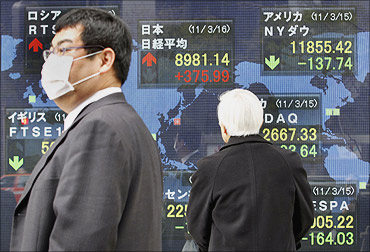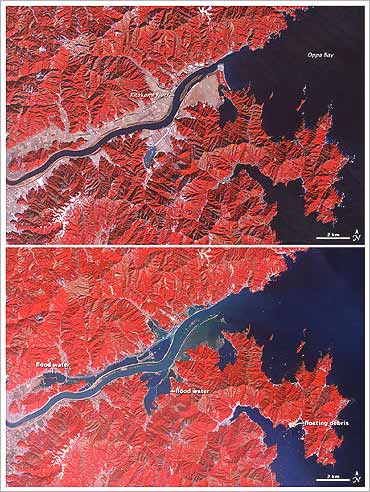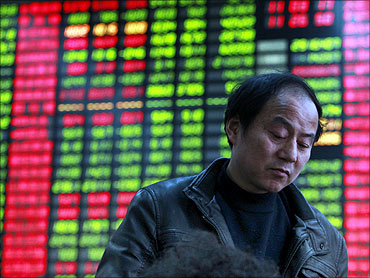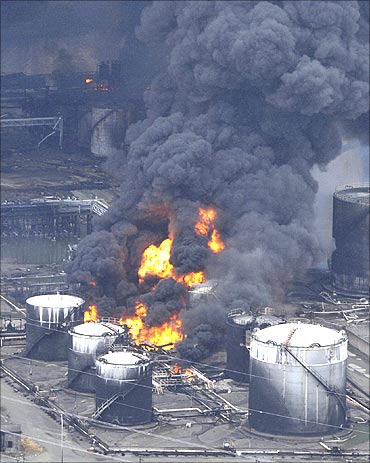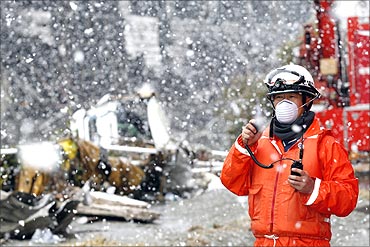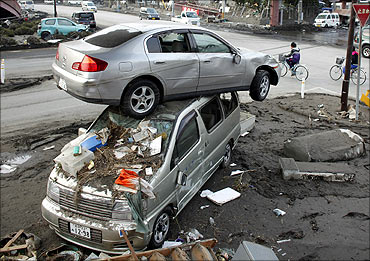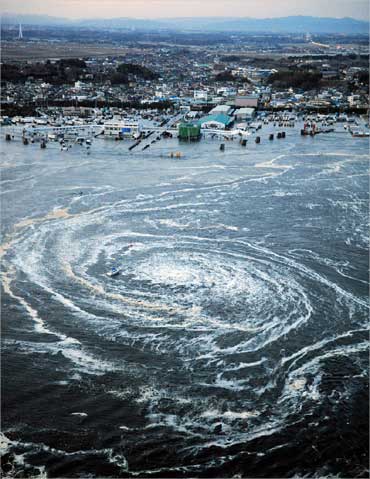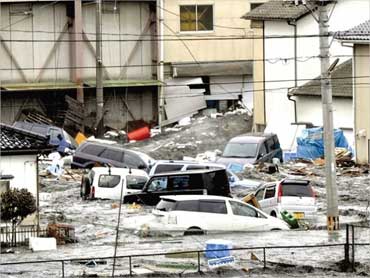 | « Back to article | Print this article |
Economic effect of Japanese disaster on India, globe
Japan's nuclear crisis and the devastations caused by last Friday's earthquake and tsunami are unlikely to trigger a global recession as happened in the aftermath of the collapse of the US investment bank Lehman Brothers three years ago, according to leading economists.
However, they expressed fears that automobile and electronic industries around the world, especially in Asia, Europe and the US, may face manufacturing delays, if the Japanese production of components remains crippled for a long period.
Concerns over a renewed global recession or a bankruptcy of Japan are unfounded, said Thomas Mayer, chief economist, Deutsche Bank, Germany's largest bank.
Even though Japan is the world's third largest economy, its share of the global gross domestic product (GDP) is below 5 per cent.
Click NEXT to read on . . .
Economic effect of Japanese disaster on India, globe
Therefore, the consequences for the global economy from the catastrophe will be very minimal, Mayer said in an interview to German economic daily Handelsblatt.
In the areas hit by the earthquake and tsunami, relatively less industries are located, but the main problem is the disruption of power supply.
The Deutsche Bank estimates that the power cuts could reduce monthly growth of the Japanese GDP by 0.1 per cent, Mayer said.
The Japanese economy has to cope with a second successive quarter of negative growth this year after a strong turnaround in 2010.
Click NEXT to read on . . .
Economic effect of Japanese disaster on India, globe
Before the earthquake and tsunami, the Deutsche Bank had forecast a 1.6 per cent growth for the Japanese economy this year.
This will have to be corrected downwards depending on whether the nuclear crisis intensifies and how long it takes to start the reconstruction, he said.
Mayer estimated the costs of reconstruction will be much higher than around 10 billion yen invested by the government after the Kobe earthquake if the situation at the crippled reactor complex in Fukushima worsens and becomes a full-blown nuclear catastrophe.
In the Kobe earthquake, much more industries were destroyed, but the number of casualties were around 6,500, which is about half of the estimated loss of lives in the present disaster, he said.
Click NEXT to read on . . .
Economic effect of Japanese disaster on India, globe
Klaus Juergen Gern of the Institute for World Economy at the University of Kiel said that the earthquake, tsunami and the unfolding nuclear crisis in Japan could affect supply of electronic components worldwide, especially chips which are crucial for a wide range of industries, including the automobile sector.
Impact might be contained: BofA-Merrill Lynch
The recent 8.9 magnitude earthquake in Japan -- and the tsunami that followed -- are a major humanitarian and economic tragedy.
BofA Merrill Lynch Global Research has issued an analysis of the effect of today's Japanese earthquake on global markets. The event's immediate market impact is likely to be contained.
Though longer-term risks do remain, they will take some more days and weeks to unfold.
Click NEXT to read on . . .
Economic effect of Japanese disaster on India, globe
So far, the most pronounced economic effect of this terrible event has been to add, in the very short term, to what we call a "risk-off" -- in other words, a temporary move by some investors out of what they perceive to be riskier assets.
Additionally, for a time markets may lose a certain amount of liquidity as Japanese investors, as well as government and corporate interests, redirect more resources toward needs tied to the quake.
But disasters, natural or otherwise, normally have only a temporary economic impact unless they provoke some large or permanent policy response -- the classic example being the Fed's dramatic rate cuts in response to 9/11.
Lessons from the past
Perhaps the most appropriate analogy to the current situation is the Kobe earthquake, which struck Japan on January 17, 1995. In that disaster, 7,000 people died and $100 billion was spent on reconstruction.
Click NEXT to read on . . .
Economic effect of Japanese disaster on India, globe
The economic consequences were both direct and indirect. The Nikkei fell 8% in five sessions, slumped 20% from its previous peak to its April 1995 trough and took 10 months to recover its losses.
The yen actually rallied 20% versus the US dollar, in response to a big repatriation of Japanese capital to pay for the recovery efforts. Asian markets fell 6% very quickly but immediately recovered, while the S&P 500 was largely unaffected.
What to watch for
The earliest financial reports out of Japan on Friday, after the earthquake, had Japanese GDP being downgraded 0.1-0.2%. That will likely take 2011 Japan GDP growth down to 1.3% for the year. If that holds, it does not sound sufficient to provoke a far-reaching Japan policy reaction.
If the earthquake does end up having a meaningful impact on global investments, it likely will be because bonds and equities could be hurt by a major withdrawal of capital by Japan.
Click NEXT to read on . . .
Economic effect of Japanese disaster on India, globe
India can take care of goods coming from Japan
India on Thursday said Japan is sharing all information regarding nuclear radiation and it has the mechanism to take care of goods coming from the tsunami-hit country.
"I think what is coming particularly is food articles and all. I can say that despite the terrible tragedy that has been fall on Japan, their institutions are efficient and they are sharing all information with other countries that includes India," Commerce and Industry Minister Anand Sharma said.
With radiation scare spreading across Asia following blasts in nuclear reactors in Japan due to last week's earthquake and tsunami, India is keeping a close watch on food items imported from the island nation.
Food Safety and Standards Authority of India chairman P I Suvarathan had said: "We are currently watching the situation as a part of the surveillance, though we have not taken a call yet to ban any of the food items."
Click NEXT to read on . . .
Economic effect of Japanese disaster on India, globe
Sharma said that the country has all the mechanism to deal with such situations.
"... whatever steps are required, we have inbuilt institutional mechanism to address these issues," he said.
While India does not import primary food items from Japan, processed foods, sea food, oil seeds and seeds of vegetables such as cauliflower and cabbage come from there, a commerce ministry official said.
Besides, fruits such as citrus along with diary products, confectionery items, tobacco products also come from Japan.
Click NEXT to read on . . .
Economic effect of Japanese disaster on India, globe
As per international media reports, South Korea, Hong Kong, Singapore and the Philippines will test Japanese food imports for radiation.
FSSAI in India as been set up under the Food Safety and Standards Act, 2006, as a statutory body to establish scientific standards on food quality and safety.
On the issues of disruption in shipping lines between India and Japan, the minister said that because of the tsunami and earthquake the movement of ships could be affected.
"It is one of the worst natural disaster ... naturally systems will get affected," he added.
Click NEXT to read on . . .
Economic effect of Japanese disaster on India, globe
He also said that industry community would do the assessment of impact of the Japan's situation on India's trade and investment.
He said that CII is preparing an internal document to asses the impact, which would be discussed both by the government and industry.
MTS India slashes calling rates to Japan
Meanwhile, telecom service provider Sistema Shyam TeleServices Ltd slashed its calling rates to Japan by 78 per cent to Rs 1.99 a minute to help connect people with friends in the earthquake-struck nation.
The earlier calling rate was Rs 9.19 per minute, he added.
